
While many smaller theatre companies tend to showcase audience-expected simple comedies and like, one thing I always enjoy about a Playhouse 615 season is the variety of shows presented by this intimate 60-seat theatre nestled in Mount Juliet, Tennessee. In recent years, they’ve mounted everything from classics like The Trip to Bountiful, The Glass Menagerie and Arsenic and Old Lace to more outlandish fare including No Sex, We’re Sixty, The Sugar Bean Sister and more. Having recently wrapped their run of The 39 Steps, Playhouse 615 continues their tradition of a non-traditional season with their current production, an adaptation of Henrik Ibsen’s Hedda Gabler.
Something else Playhouse 615 isn’t afraid to do…present a show for more than a quick two-week run. To that end, their production of Hedda Gabler debuted the first weekend of April and will conclude its run with shows Friday, April 26 through Sunday, April 28. Last week, with the cast midway through the run, I had a chance to chat with them for my latest Rapid Fire 20Q. Those conversations follow.
————-
RAPID FIRE 20Q WITH THE CAST OF PLAYHOUSE 615’S HEDDA GABLER
 RAPID FIRE WITH HEDDA GABLER’s ERIN GRACE BAILEY
RAPID FIRE WITH HEDDA GABLER’s ERIN GRACE BAILEY
JHPENTERTAINMENT: You’re cast as the lead in Hedda Gabler. What can you tell me about the character?
ERIN GRACE BAILEY: Hedda is a complicated person, and if anything, I think it makes her more realistic. I learn more about who she is and how she responds to the world around her every single time we perform the show. For this reason, I think she’s an exciting and dynamic character. Anyone who sees this show more than once isn’t going to see the same thing twice.
JHPENTERTAINMENT: In addition to starring in the show, you also adapted the play. Forgive the alliteration, but Hedda is pretty heady stuff. What drew you to adapting this work?
ERIN GRACE BAILEY: Well, it really wasn’t my intention to adapt it at first. What changed my mind was reading a bunch of adaptations over and over again. While there are some really awesome ones out there, none of them felt right to me. Hedda is a young woman who suffers from mental health issues and struggles with the gender roles put on to her by those around her. Oftentimes, there isn’t a lot of focus on these things though because Hedda is bright. She’s also a manipulator and makes some horribly harmful decisions that affects the other characters’ trajectories, but in the end, I’ve always been taught, in drama, if you can’t empathize with or care about the character, no matter how awful their decisions are, the tragedy isn’t tragic. I sort of feel like the best way to create empathy for a character is to have it written by someone who understands them, and while I haven’t been through everything Hedda has been through, I relate to her in many ways, especially being in a similar stage of life as her. When we were looking for adaptations of the play to perform, it was hard to find any adaptations written by women, especially contemporary adaptations (which was the route we already knew we wanted to go with it), so in the end, we thought creating our own adaptation would serve us better than trying to conform to someone else’s.
JHPENTERTAINMENT: When you began adapting it, was there always the idea that you’d also star in your own adapted version?
ERIN GRACE BAILEY: Yes, this project actually went a little bit backwards from the usual process. Instead of picking a script and then auditioning and casting it, this one went the other way around. Joel Meriwether, the artistic director at Playhouse, asked me to play Hedda about a year ago. After reviewing different versions of the script, none of them felt exactly right for us or like it focused on the message we wanted to convey, so I decided to adapt the script after that.
JHPENTERTAINMENT: From what I know, the set is something a bit different for Playhouse 615 in that it not only extends from the usual stage, but also incorporates theater seating on stage. What went into that design decision?
ERIN GRACE BAILEY: I absolutely love performing in the round or on a thrust stage. I did it a lot in college, and I’ve missed it tremendously. I think it’s more intimate and realistic for the actors, and everyone in the audience gets a unique perspective of the story. So much of this particular play is about being stifled or feeling like you’re under someone’s microscope. We wanted the audience to sort of feel like they’re intruding on something, like they’re sitting in the Tesmans’ living room watching everything crumble. In the end, it also just ended up being a more practical decision as well because it gave us a little more space as actors to play.
JHPENTERTAINMENT: Henrik Ibsen’s original was written in Danish, so I have to ask. Unless you speak Danish, what version did you base your adaptation on?
ERIN GRACE BAILEY: Ha! No, I do not speak Danish. I drew inspiration from several different adaptations, but I primarily used a direct translation by Una Ellis-Fermor because I wanted to use a translation or adaptation that was written by a woman, which as I mentioned previously, was a surprisingly difficult find. Ironically, I happened upon Ellis-Fermor’s translation while on a trip to McKay’s when I wasn’t even looking for it, so whoever decided to sell their copy, it was meant to be!
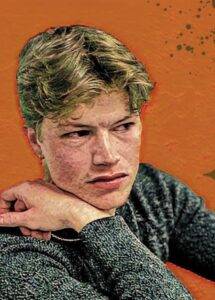 RAPID FIRE WITH HEDDA GABLER’s WILL HENKE
RAPID FIRE WITH HEDDA GABLER’s WILL HENKE
JHPENTERTAINMENT: You’re playing Ejlert Lövborg in Playhouse 615’s Hedda Gabler. Who is Lövborg to you?
WILL HENKE: Ejlert is a misunderstood man within his own mind and the world around him. There is a certain disconnect with the way his mind and body communicates and often sabotages one another and a most universal disconnect between his existence and his peers. His inability to conform and find meaning in his life is temporarily remedied by the company of Hedda Gabler, who may (or may not) be the missing piece to his inevitable demise.
JHPENTERTAINMENT: Is it just me, or do you hear ‘loverboy’ in the character’s name?
WILL HENKE: Funny that you say that! I always heard “I Love” in Ejlert. He’s Ibsen’s own unorthodox version of a hopeless romantic.
JHPENTERTAINMENT: How familiar were you with Hedda Gabler prior to auditioning for the role?
WILL HENKE: Without outing myself too much, I was completely unfamiliar with Hedda Gabler before the show. I’ve read A Doll’s House to fulfill my Ibsen quota, but most of my theatrical literature is devoted to contemporary pieces (see: Jackie Sibblies Drury, Brandon Jacob Jenkins for my faves).
JHPENTERTAINMENT: I just spoke with your co-star, Eric Grace Bailey, who also adapted Ibsen’s work for this production. She opted to shift the time and setting to modern day. How do you think that enhances this particular version?
WILL HENKE: I think the charm of the modernization lies in the very ability to do so. Setting Hedda in current times as opposed to 1890s Norway is a testament to the timelessness of the piece.
JHPENTERTAINMENT: Your show bio includes a mention of your theatre origin, having played Horse #3 in a high school production of Cinderella. How did that humble beginning prepare you for a life on stage?
WILL HENKE: There are no small parts. Just small horses.
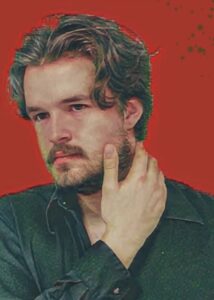 RAPID FIRE WITH HEDDA GABLER’s SAWYER LATHAM
RAPID FIRE WITH HEDDA GABLER’s SAWYER LATHAM
JHPENTERTAINMENT: How would you describe Judge Brack, the character you play in Hedda Gabler?
SAWHER LATHAM: Brack, in simple terms, is a power hungry narcissist. His entire driving force is manipulating the people around him and he derives pleasure from bending people to his will. Just a stand up guy.
JHPENTERTAINMENT: Playhouse 615 audiences might recognize you from your recent turn in their production of The Woman in Black. What is it about your experience at Playhouse 615 that prompted a return for another show?
SAWHER LATHAM: The environment behind the scenes is one of the best in Nashville and the surrounding areas. There’s a certain feeling you get when you’re around people who care as much as you do. I get that feeling here.
JHPENTERTAINMENT: Your admitted AI-generated acting resume, though mildly entertaining, is largely bereft of any real details of your former roles aside from Smoke during The Bell Witch Fall Festival. What was your first stage performance?
SAWHER LATHAM: My first onstage performance was with the Theatre Bug back in like 2015. I played a little techie kid in Showmance. I don’t remember too much from that process but I must have enjoyed it to still be around doing it today.
JHPENTERTAINMENT: What is it about Hedda Gabler that continues to interest audiences and remain relevant some 131 years after Ibsen first wrote it?
SAWHER LATHAM: I mean, it’s a classic for a reason. I don’t think I can add anything to it that hasn’t been said already. Ibsen created such an interesting world with incredibly complex characters. Ahead of his time.
JHPENTERTAINMENT: Your co-star, Eric Grace Bailey of course also adapted this particular presentation. Being the premiere production of this iteration, were there scene in her adaptation that were edited or changed as rehearsals went along?
SAWHER LATHAM: There were definitely trims along the way but in whole it’s remained mostly intact from the first draft. I was lucky so most of my things remained unchanged so I never had to
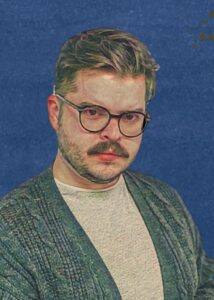 RAPID FIRE WITH HEDDA GABLER’s MILES GATHRELL
RAPID FIRE WITH HEDDA GABLER’s MILES GATHRELL
JHPENTERTAINMENT: Who is George Tesman to you?
MILES GATRELL: George is the definition of a guy who looks good on paper: kind, promising career, good family. Unfortunately, in practice he lacks the emotional intelligence for a healthy relationship. He’s someone who is always falling a little short, but can’t understand why.
JHPENTERTAINMENT: As George, you play Hedda’s easy-going, but inevitably put-upon husband. How is Erin Grace as a co-star?
MILES GATRELL: Erin Grace is the reason I’m part of this show! We had the opportunity to work together last year in the Actor’s Bridge production of Things I Know to Be True. She’s talented, professional, and a joy to collaborate with.
JHPENTERTAINMENT: Your character also shares an on-stage relationship with Beth Henderson’s Juliana Tesman, George’s aunt. I’ve gotta tell you, I consider Beth one of my ‘theatre crushes’, having seen her in a multitude of roles through the years and always being absolutely grateful for the opportunity. How has it been to share the stage with Beth?
MILES GATRELL: This is my first time working with Beth, and I’ve very much appreciated her presence in this show. Her focus and dedication helped ground me during the process, and working our scenes has felt like a breeze.
JHPENTERTAINMENT: Alright, I’m not letting this interview end without going completely off topic to ask about your vintage toy collection. Fellow vintage toy and pop culture nerd here. My favorite item in my collection would have to be my original Bionic Woman lunchbox that I’ve had since I was a kid. What’s among your favorites?
MILES GATRELL: I’m sure some people will balk at this being considered vintage now, but I have a small Pokémon statue that was given away at the 1998 Tokyo TV Fair. As far as I can tell only one has ever been sold on eBay, and it’s quite difficult to find information about it. I managed to snag it from a junk store in Des Moines, Iowa for about four bucks.
JHPENTERTAINMENT: Like your co-star, I understand you’ve also written and produced a couple of plays. Do you believe being creative in both regards enhances your performance as an actor?
MILES GATRELL: I think dipping into playwriting can be very helpful for an actor. Performers can become very focused on their character, and what they hope to achieve in the role. I think it is important to always check back in with the larger story being told. Playwriting makes it easier to understand how your character fits into, and complements that bigger picture.
—————
Playhouse 615’s Hedda Gabler completes its four-week run with performances Friday, Saturday and Sunday, April 26, 27 and 28 with evening performances at 7:30p.m. on Friday and Saturday and a final Sunday matinee at 2:30p.m. Playhouse 615 is offering a special BOGO (buy one get one) ticket offer for $20 (that’s the usual price of one ticket). CLICK HERE to purchase tickets. You can also reserve your spot by calling the box office at 615.319.7031, or you can purchase tickets (if available) at the door, day of show, an hour before curtain.
Up next for Playhouse 615 is Nunsense, directed by Daniel Vincent and starring Linda Gaille, Ann Street Kavanagh, Diane Bearden-Enright, Cat Eberwine and Takiah Ledo. Nunsense runs May 10-May 26. CLICK HERE for tickets. For more on the show and to keep up with Playhouse 615, check out their website or follow them on Facebook.
As always, if you wanna follow JHPEntertainment to find out who I’m chatting with for my next Rapid Fire Q&A, or for my take on the latest local and national theatre, music and movie offerings, follow us on Facebook, Instagram and Twitter.
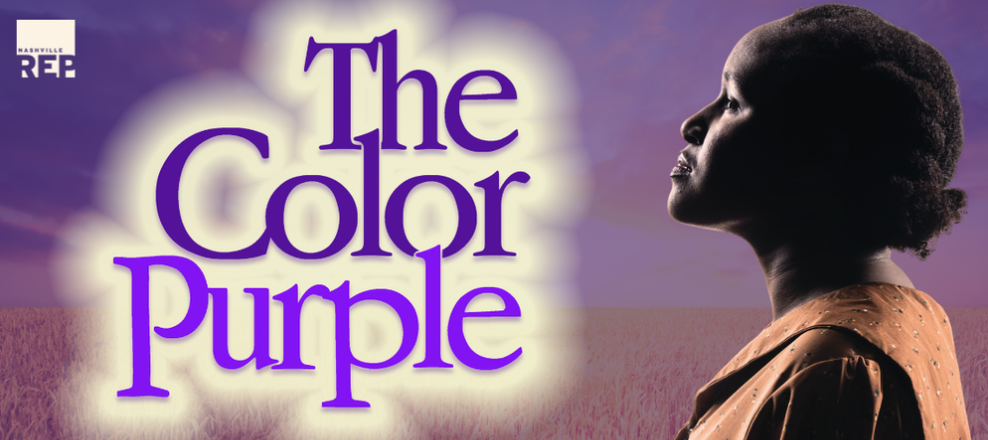
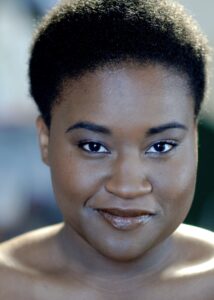 RAPID FIRE WITH THE COLOR PURPLE’s SOFIA, SHINNERRIE JACKSON
RAPID FIRE WITH THE COLOR PURPLE’s SOFIA, SHINNERRIE JACKSON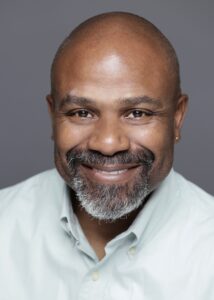 RAPID FIRE WITH THE COLOR PURPLE’s MISTER, ELLIOTT WINSTON ROBINSON
RAPID FIRE WITH THE COLOR PURPLE’s MISTER, ELLIOTT WINSTON ROBINSON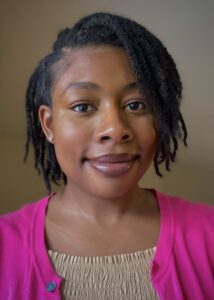 RAPID FIRE WITH THE COLOR PURPLE’S SQUEAK, RAVEN BYNTYN
RAPID FIRE WITH THE COLOR PURPLE’S SQUEAK, RAVEN BYNTYN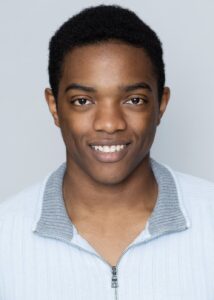 RAPID FIRE WITH THE COLOR PURPLE’S HARPO, GEROLD OLIVER
RAPID FIRE WITH THE COLOR PURPLE’S HARPO, GEROLD OLIVER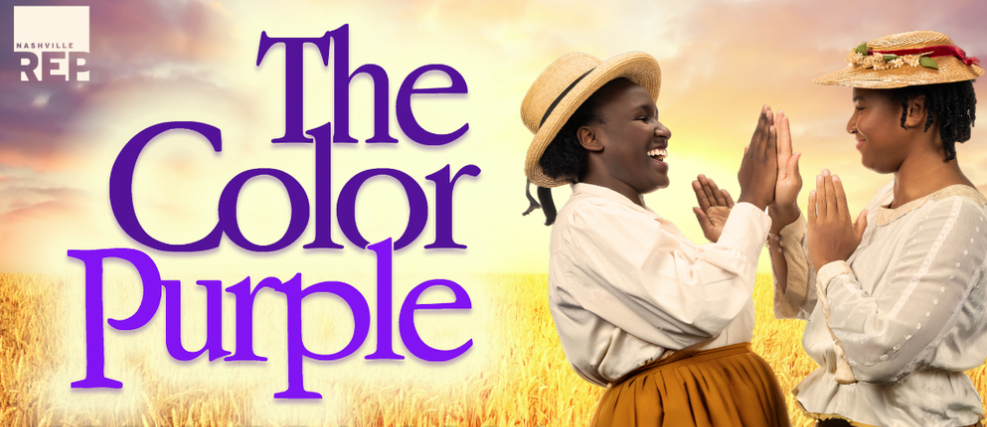
 RAPID FIRE WITH THE COLOR PURPLE’s DIRECTOR, REGGIE LAW
RAPID FIRE WITH THE COLOR PURPLE’s DIRECTOR, REGGIE LAW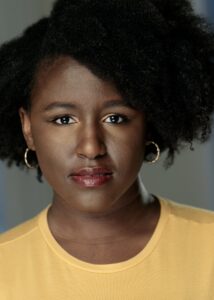 RAPID FIRE WITH THE COLOR PURPLE’s CELIE,
RAPID FIRE WITH THE COLOR PURPLE’s CELIE, 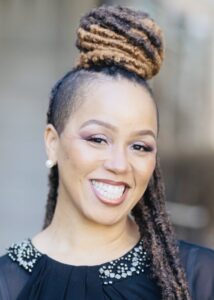 RAPID FIRE WITH THE COLOR PURPLE’s SHUG AVERY, TAMICA NICOLE
RAPID FIRE WITH THE COLOR PURPLE’s SHUG AVERY, TAMICA NICOLE 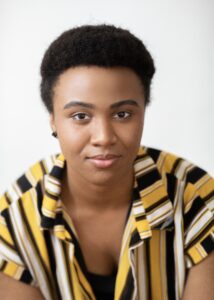 RAPID FIRE WITH THE COLOR PURPLE’s NETTIE, MAYA RILEY
RAPID FIRE WITH THE COLOR PURPLE’s NETTIE, MAYA RILEY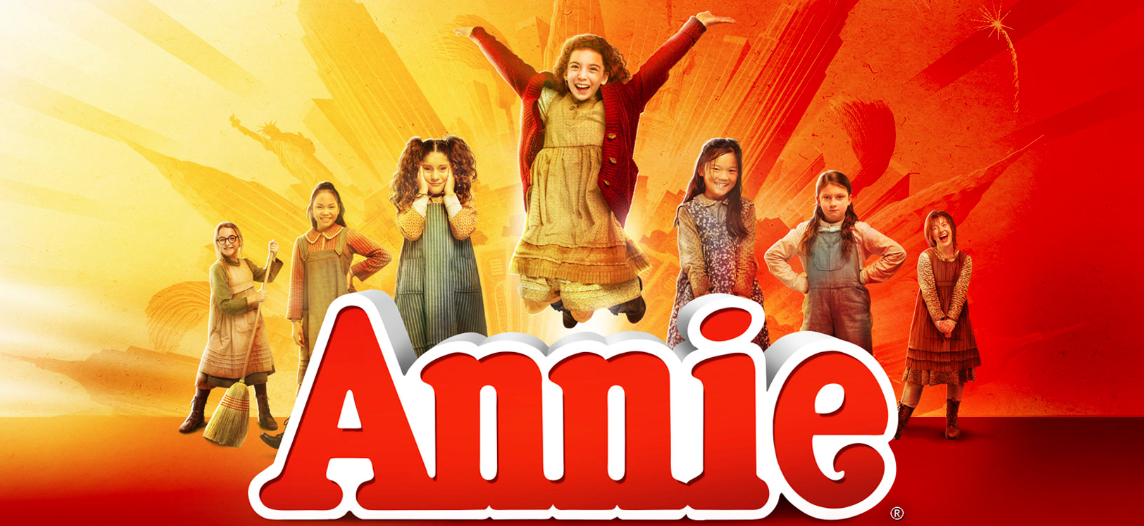
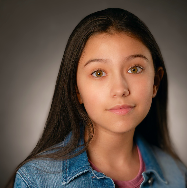 RAPID FIRE WITH ANNIE STAR, RAINEY TREVINO
RAPID FIRE WITH ANNIE STAR, RAINEY TREVINO RAPID FIRE WITH ANNIE’s SANDY BY WAY OF TRAINER, CHARLOTTE WOERTLER
RAPID FIRE WITH ANNIE’s SANDY BY WAY OF TRAINER, CHARLOTTE WOERTLER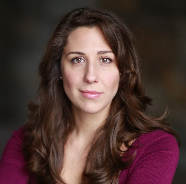 RAPID FIRE WITH ANNIE’s MISS HANNIGAN, STEFANIE LONDINO
RAPID FIRE WITH ANNIE’s MISS HANNIGAN, STEFANIE LONDINO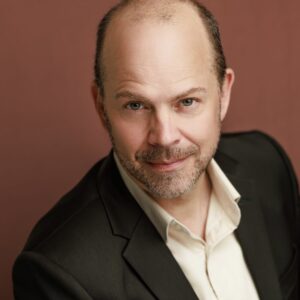 RAPID FIRE WITH CHRISTOPHER SWAN, OLIVER WARBUCKS IN ANNIE
RAPID FIRE WITH CHRISTOPHER SWAN, OLIVER WARBUCKS IN ANNIE
 RAPID FIRE WITH VARIETY ON MAIN’s MANDY BARNETT
RAPID FIRE WITH VARIETY ON MAIN’s MANDY BARNETT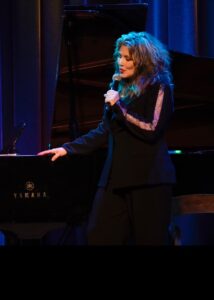
 RAPID FIRE WITH VARIETY ON MAIN’s MONICA RAMEY
RAPID FIRE WITH VARIETY ON MAIN’s MONICA RAMEY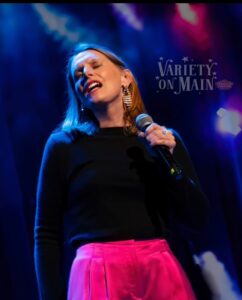

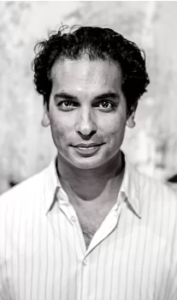 RAPID FIRE WITH MRS. KRISHNAN’S PARTY CO-WRITER, JACOB RAJAN
RAPID FIRE WITH MRS. KRISHNAN’S PARTY CO-WRITER, JACOB RAJAN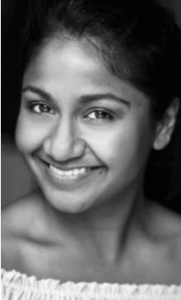 RAPID FIRE WITH MRS. KRISHNAN’s PARTY‘s ZINA KRISHNAN, KALYANI NAGARAJAN
RAPID FIRE WITH MRS. KRISHNAN’s PARTY‘s ZINA KRISHNAN, KALYANI NAGARAJAN 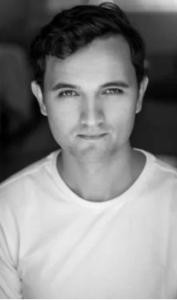 RAPID FIRE WITH MRS. KRISHNAN’s PARTY’s JAMES, JUSTIN TE HONIHANI POKAIHAU ROGERS
RAPID FIRE WITH MRS. KRISHNAN’s PARTY’s JAMES, JUSTIN TE HONIHANI POKAIHAU ROGERS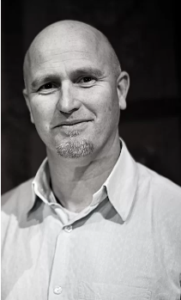 RAPID FIRE WITH MRS. KRISHNAN’s PARTY’s CO-WRITER/DIRECTOR, JUSTIN LEWIS
RAPID FIRE WITH MRS. KRISHNAN’s PARTY’s CO-WRITER/DIRECTOR, JUSTIN LEWIS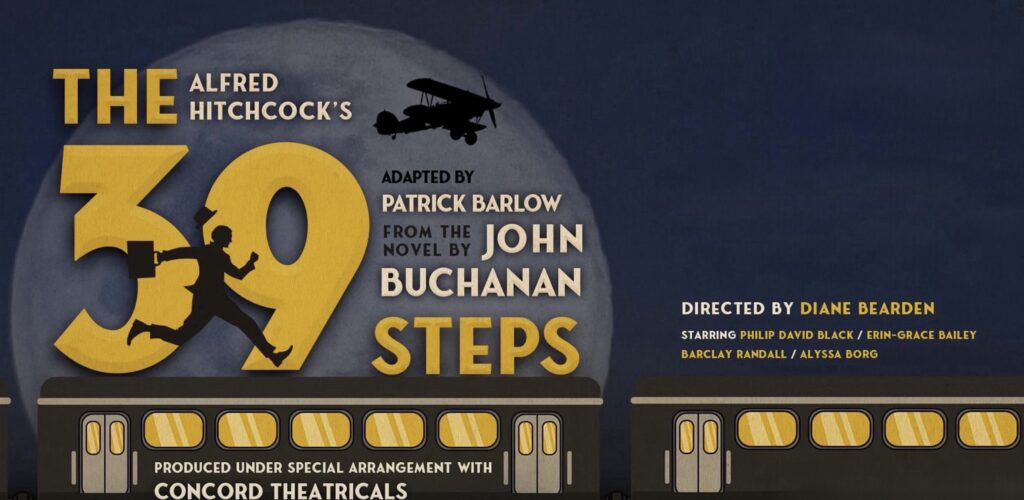
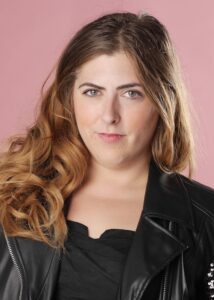 RAPID FIRE WITH THE 39 STEPS’ CLOWN 2, ALYSSA BORG
RAPID FIRE WITH THE 39 STEPS’ CLOWN 2, ALYSSA BORG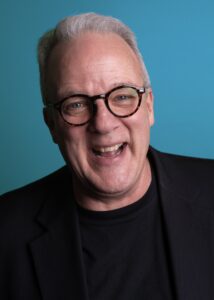 RAPID FIRE WITH BARCLAY RANDALL, THE 39 STEPS’ CLOWN 1
RAPID FIRE WITH BARCLAY RANDALL, THE 39 STEPS’ CLOWN 1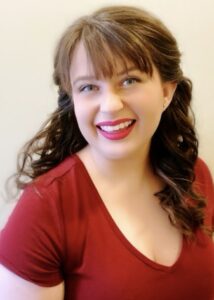 RAPID FIRE WITH ERIN GRACE BAILEY, THE 39 STEPS’ ANNABELLA, MARGARET & PAMELA
RAPID FIRE WITH ERIN GRACE BAILEY, THE 39 STEPS’ ANNABELLA, MARGARET & PAMELA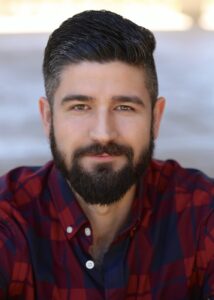 RAPID FIRE WITH PHILIP DAVID BLACK, THE 39 STEPS’ RICHARD HANNAY
RAPID FIRE WITH PHILIP DAVID BLACK, THE 39 STEPS’ RICHARD HANNAY
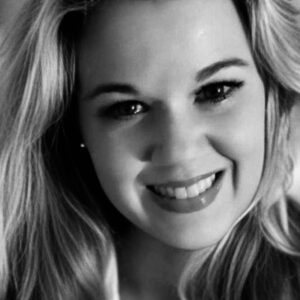 RAPID FIRE WITH CLOSER’s ANGELA GIMLIN
RAPID FIRE WITH CLOSER’s ANGELA GIMLIN JHPENTERTAINMENT: You play Anna. What can you tell me about her?
JHPENTERTAINMENT: You play Anna. What can you tell me about her? RAPID FIRE WITH CLOSER’s BRITT BYRD
RAPID FIRE WITH CLOSER’s BRITT BYRD BRITT BYRD: I was quite reckless in my 20s, yeah. But who wasn’t in one way or another? I learned a lot of hard but valuable lessons from sabotaging my own happiness in those days, and I like to think I’ve grown up a lot since then, so I cut Alice a lot of slack for her mistakes.
BRITT BYRD: I was quite reckless in my 20s, yeah. But who wasn’t in one way or another? I learned a lot of hard but valuable lessons from sabotaging my own happiness in those days, and I like to think I’ve grown up a lot since then, so I cut Alice a lot of slack for her mistakes.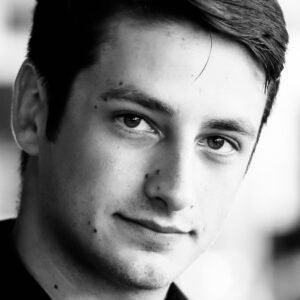 RAPID FIRE WITH CLOSER’s ROSS CANALES
RAPID FIRE WITH CLOSER’s ROSS CANALES JHPENTERTAINMENT: There are some very intense scenes in Closer. How do you prepare for such somber moments in the script?
JHPENTERTAINMENT: There are some very intense scenes in Closer. How do you prepare for such somber moments in the script? RAPID FIRE WITH CLOSER’s JEREMY JAMES CARMICHAEL
RAPID FIRE WITH CLOSER’s JEREMY JAMES CARMICHAEL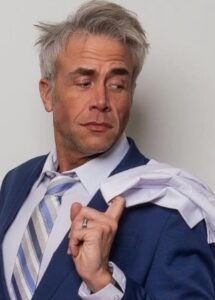 JHPENTERTAINMENT: Closer is being presented at the Annex on the second floor above Third Coast Comedy Club. What’s the advantage of presenting this particular show in such an intimate space?
JHPENTERTAINMENT: Closer is being presented at the Annex on the second floor above Third Coast Comedy Club. What’s the advantage of presenting this particular show in such an intimate space?
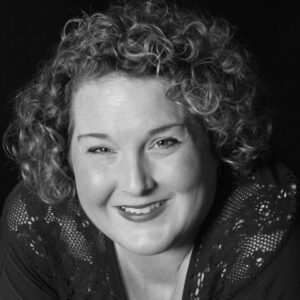 RAPID FIRE WITH STEEL MAGNOLIAS’ CLAIREE, JOY TILLEY PERRYMAN
RAPID FIRE WITH STEEL MAGNOLIAS’ CLAIREE, JOY TILLEY PERRYMAN RAPID FIRE WITH STEEL MAGNOLIAS’ OUISER, CHERYL SINGTON
RAPID FIRE WITH STEEL MAGNOLIAS’ OUISER, CHERYL SINGTON RAPID FIRE WITH STEEL MAGNOLIAS’ TRUVY, COURTNEY LINAM
RAPID FIRE WITH STEEL MAGNOLIAS’ TRUVY, COURTNEY LINAM RAPID FIRE WITH STEEL MAGNOLIAS’ SHELBY, MACY SAULS
RAPID FIRE WITH STEEL MAGNOLIAS’ SHELBY, MACY SAULS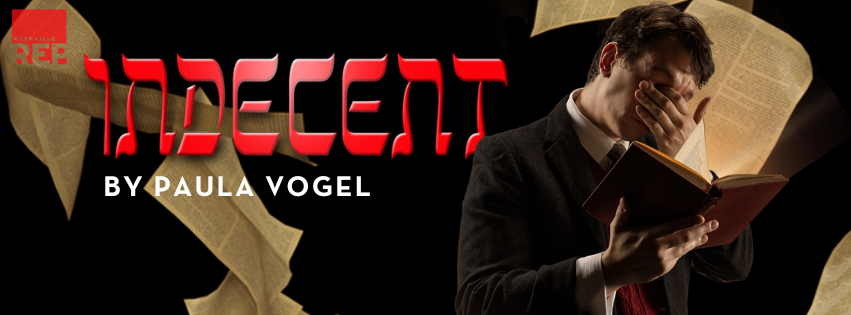
 RAPID FIRE WITH INDECENT DIRECTOR, MICAH-SHANE BREWER
RAPID FIRE WITH INDECENT DIRECTOR, MICAH-SHANE BREWER RAPID FIRE WITH INDECENT’s THOMAS DeMARCUS
RAPID FIRE WITH INDECENT’s THOMAS DeMARCUS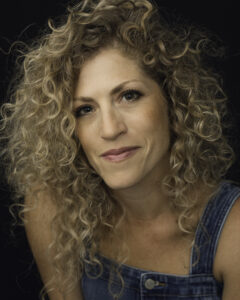 RAPID FIRE WITH INDECENT’s SARAH AILI
RAPID FIRE WITH INDECENT’s SARAH AILI RAPID FIRE WITH INDECENT‘s ERIC SORRELS
RAPID FIRE WITH INDECENT‘s ERIC SORRELS